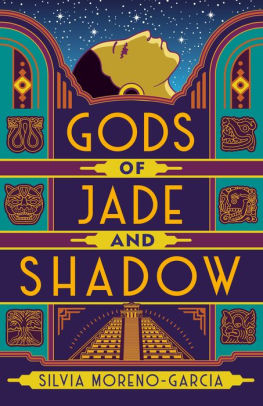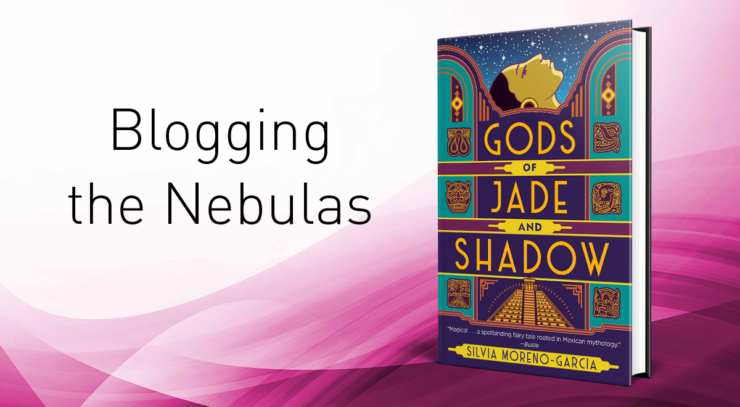The Nebula Awards could be described as the Academy Awards of SFF literature; they are voted on by the professional peers of the award nominees—members of the Science Fiction and Fantasy Writers of America. There are six nominees in the best novel category this year. Every day this week, I will be reviewing each of them and figuring their odds of taking home the prize. Welcome to Blogging the Nebulas 2020.
The Pitch
Silvia Moreno-Garcia’s Gods of Jade and Shadow begins as a Cinderella tale of sorts. In the wake of her father’s death, young Casiopeia Tun moved with her mother to live with her wealthy, standoffish grandfather on his estate in Uukumil, a small town in southeastern Mexico. It is the 1920s, the dawn of the Jazz Age, but Casiopeia’s life is filled with anything but glitz and glamour: she is barely tolerated by her grandfather, who holds the promise of her meager inheritance over her head like a boulder, and looked down upon by her relations, who treat her like the help.
This is a fairy tale of sorts, and we know that this lowborn girl has a grander destiny in store than shining her cousins’ shoes. But instead of finding a fairy godmother to change her life, Casiopeia instead encounters a god of death: After her latest humiliation, she impulsively opens a locked trunk in her grandfather’s bedroom and uncovers a stash of gleaming bones. She touches them and is pierced through the palm by a small ivory shard, and this proves to be enough of a blood sacrifice to awaken the Mayan death god Hun-Kamé, one of the Hero Twins whose legend is told in the Popul Vuh, an ancient Mayan mythological text. Hun-Kamé had been imprisoned in the chest via a scheme concocted by his brother Vucub-Kamé, who took the extra precautionary step of scattering his twin’s body parts across Mexico in an effort to keep him from regaining control of the underworld. (No matter the cultural tradition, no one does intra-family feuds like the gods.)
Bound to Casiopeia by blood but still lacking in the godlike powers department, Hun-Kamé enlists the sheltered girl as his companion on a grisly fetch quest around period Mexico in search of his missing appendages and organs, which, once recovered, will restore him to power and allow him to reclaim his throne. Thus begins a travelogue across a richly rendered landscape in which details both magical and mundane intertwine in worldbuilding and lyrical language that recreates the feeling of the oldest of stories—the stories of the old country—shared by your most ancient and beloved relatives. On their journey, Casiopeia and Hun-Kamé encounter sorcerers, demons, and stranger supernatural creatures still…and with each body part they recover, the god becomes a little more godlike and the girl loses a bit of her humanity.
Buy the Book


Gods of Jade and Shadow
Meanwhile, Vucub-Kamé isn’t taking his brother’s escape lying down. He enlists Casiopeia’s cruel cousin Martin to serve as his own human proxy. Their winding paths will eventually meet in Xibalba, the Mayan underworld, where a contest of human wills will determine the fate of gods, and perhaps that of the world of men.
This is a tale rich in both character and themes. Casiopeia’s coming of age as a strong-willed young woman, in a family and a cultural tradition that would rather she not be so, is rewarding and endearing, and I appreciated that her relationship with her immortal traveling companion didn’t venture down the road of star-cross’d romance that I initially assumed it would (not that there’s anything wrong with that; see N.K. Jemisin’s Nebula-nominated The Hundred Thousand Kingdoms). Hun-Kamé and Vucub-Kamé’s rivalry is one for the ages, and the conflict at its center—Vucub-Kamé wants to return the the days of obedience and blood sacrifice, while Hun-Kamé is more willing to live and let humans live—mirrors early 20th-century Mexico’s own push and pull between tradition and modernity, and is reflected in Casipoeia’s fantastical bildungsroman.
Admittedly much of my appreciation for this novel stems from the fact that its fantastical trappings and mythic underpinnings are from a country and a culture not my own, and exploring them was my own journey of discovery. But that is not to discount the author’s brilliance at deftly weaving them into a tale that will resonate with all sorts of readers; no matter the blood that courses through your veins, everyone loves a good quest.
Why it could win
As I’ve mentioned a few times throughout this review series, the Nebula voters seem fond of fantasy on the whole, and while it is tempting to slot Gods of Jade and Shadow alongside Naomi Novik’s recently victorious Uprooted (both are women-centered coming-of-age stories that reinterpret old myths from a strong feminist perspective), I think that does a disservice to the originality of Moreno-Garcia’s novel.
Its blending of period history—Mexico amid the Jazz Age—and Mayan legend dovetails fantastically with the themes of changing and challenging tradition that power the narrative. I’d wager that most English-speaking readers—and certainly many Americans—will find the pantheon of gods and demons described within to be fresh and fascinating. There have been other fantasy novels set in a seemingly similar mythological milieu—Aliette de Bodard’s Obsidian and Blood series comes to mind, though it is set much further in the past and concerned with Aztec, rather than Mayan, cultural traditions—but the combination of the early 20th-century setting, the mythological underpinnings, and the Hero’s Journey that Casiopeia experiences is something new.
The fact that this is the author’s fourth novel also seems worth mentioning, here. She’s sharing a ballot with four first-timer novelists, and as much as I love the thrill of the new, there’s something to be said for a writer who has honed her craft. Silvia Moreno-Garcia has leveled up with every one of her books, and it’s no surprise that Gods of Jade and Shadow was her first to really break through, both in terms of sales and on the Nebula ballot. It’s an accomplished work, with lyrical prose and wonderfully rich characters. I think there’s a good chance Nebula voters will be suitably impressed.
Why it may not win
While I’ve already made the favorable comparison to Uprooted, this book also shares similarities with a lot of other fantasy novels that have made the Nebula ballot—and not won. Period pieces set in our recent past—or a close fantastical facsimile—abound among recent lists of finalists. Witchmark, Everfair, Jade City, Amberlough, Ironskin, The Golem and the Jinni: These books are varied in setting and even subgenre, and though all are excellent, none have collected enough votes to take home the top prize.
This point feels flimsy, I admit; truth be told, the ballot is so strong this year, my feelings about how a particular book will fare are just that: feelings. I would be surprised to see this one win the Nebula, not because I don’t think it is a deserving winner, but because I haven’t encountered the sort of unbridled enthusiasm for it in my wanderings across the internet as I have some of the other nominees. I have a sense that it’s the sort of book that will be in first place on a few lists, but in second or third on a lot more.
Whether it wins or not, I’m certainly glad Gods of Jade and Shadow is on this year’s ballot: I’ve been following Silvia Moreno-Garcia since an advance copy of her first novel, Signal to Noise, came across my desk shortly after I began editing an SFF blog for Barnes & Noble. In the years since, she hasn’t written the same book twice, and each one has been better than the last—which, if you follow my logic, should tell you that this one is her best. You should read it.
Joel Cunningham was the founding editor of the B&N Sci-Fi & Fantasy Blog (RIP), where he explored the galaxy for 5 years, picking up a Hugo Award (well, tangentially) along the way. He’s now managing editor of Lifehacker, which means he’s managing at least one thing nowadays. He lives in an apartment in Brooklyn with his wife and two children and hopes to go outside again someday. He tweets @joelevard.










